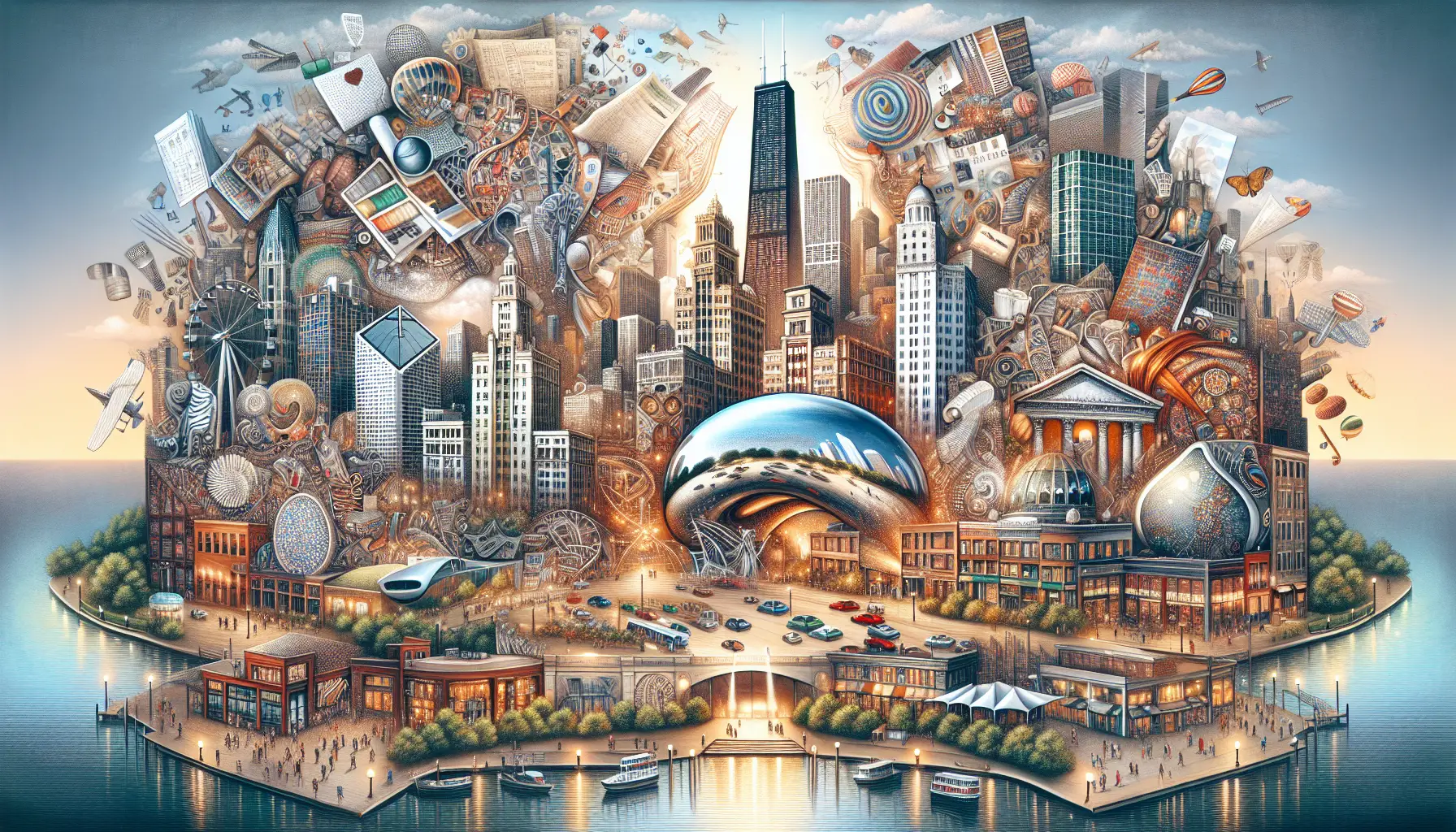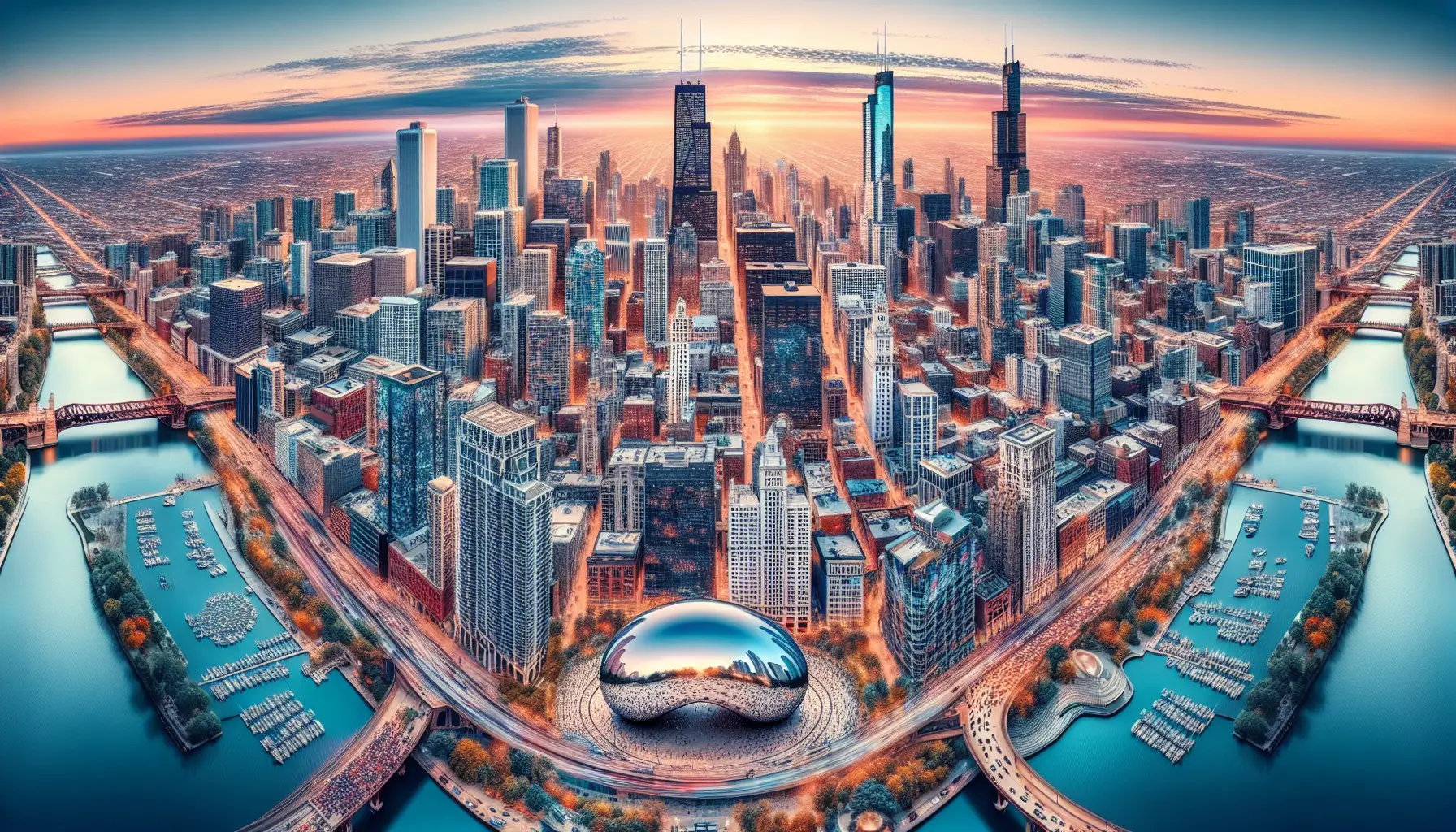Chicago, a vibrant city known for its diverse culture and stunning architecture, has earned the nickname “The Windy City” due to its unpredictable and gusty winds. However, this bustling metropolis is much more than just wind; it is also recognized as the birthplace of the skyscraper and hometown of deep-dish pizza. Delve into the rich history and iconic landmarks of Chicago, as we explore what this beloved city is commonly known for.
Click to see ALL the Avialable Attraction in Chicago
The Windy City
Origin of the nickname
Chicago is commonly known as “The Windy City,” a nickname that dates back to the 19th century. It is believed that the nickname originated from the city’s reputation for strong and gusty winds. However, it is important to note that the nickname is not related to the city’s actual weather conditions, but rather to its political and social climate during that time.
The origins of the nickname can be traced back to the late 1800s when Chicago was vying to host the World’s Columbian Exposition in 1893. During this time, there was fierce rivalry between Chicago and New York City. To promote itself as a contender for the exposition, Chicagoans were known for their boastful and windy rhetoric. This is why the nickname “The Windy City” stuck.
Popularity and usage
Since its origin, the nickname “The Windy City” has become synonymous with Chicago. It is widely recognized and used both by locals and visitors. The nickname is often mentioned in popular culture, making appearances in literature, music, and movies. Chicagoans embrace the nickname, often using it affectionately to refer to their beloved city.
The Second City
Origin of the nickname
Another nickname often associated with Chicago is “The Second City.” Contrary to what some may think, this nickname does not imply that Chicago is inferior or less important than another city. In fact, it stems from a different historical context.
The origins of the nickname “The Second City” can be traced back to an essay written by A. J. Liebling in 1952. Liebling used the term to emphasize Chicago’s historical role as the second most important city in the United States in terms of population and economic significance. The nickname highlights Chicago’s rise to prominence, trailing only behind New York City.
Significance and comparison to New York City
Being called “The Second City” is a point of pride for Chicagoans. It represents the city’s resilience and determination to establish itself as a major player, despite being in the shadow of New York City. The nickname acknowledges Chicago’s cultural and economic contributions, highlighting its unique character.
While New York City may be the financial and cultural hub of the country, Chicago has its distinct charm and identity. The nickname “The Second City” is a constant reminder that Chicago can hold its own and has its own distinct achievements and strengths.
Chi-Town
Origin of the nickname
“Chi-Town” is a popular and widely used nickname for Chicago. Its origin is not precisely known, but it is believed to have emerged from the city’s vibrant hip-hop and rap music scene in the 1980s. The term was popularized by local artists who used it as a shorthand reference to their hometown.
Popularity and usage
Despite its informal origin, “Chi-Town” has become one of the most recognizable nicknames for Chicago. It is used by locals, visitors, and celebrities alike. The nickname has transcended its musical roots and has been embraced by various industries and cultural communities.
“Chi-Town” has a sense of familiarity and affection associated with it. It captures the essence of the city’s vibrancy and diversity. From sports teams to local businesses, the nickname is frequently used as a shorthand reference to Chicago.
The City of Big Shoulders
Origin of the nickname
“The City of Big Shoulders” is a nickname that embodies the strength, resilience, and work ethic associated with Chicago. It comes from a poem titled “Chicago” written by Carl Sandburg in 1914.
In his poem, Sandburg describes Chicago as a city with broad shoulders, capable of carrying the burdens and challenges that come its way. The nickname highlights Chicago’s industrial heritage and the hardworking nature of its residents.
Meaning and symbolism
“The City of Big Shoulders” speaks to the character of Chicago and its people. It symbolizes the city’s ability to withstand challenges, adapt, and thrive. It represents the blue-collar spirit and determination of its residents, who have contributed to the city’s growth and success.
This nickname serves as a reminder of the city’s industrial past and the role it played in shaping the nation’s economy. It symbolizes Chicago’s heritage as a city built on hard work, innovation, and determination.
Hog Butcher for the World
Origin of the nickname
“Hog Butcher for the World” is a unique and somewhat somber nickname for Chicago. It originated from Carl Sandburg’s poem “Chicago,” where he portrays the city’s role in the meatpacking industry during its heyday.
Sandburg’s poem paints a vivid picture of Chicago as a bustling center for the processing and distribution of meat. The nickname embraces the reality that Chicago was once the largest meatpacking center in the world, responsible for feeding not only the nation but also other parts of the world.
Historical significance
The nickname “Hog Butcher for the World” carries historical significance, representing an important era in Chicago’s industrial history. It reflects the city’s past reliance on the meatpacking industry, which played a vital role in its economy and growth.
Although the meatpacking industry no longer holds the same significance as it once did, the nickname serves as a reminder of an essential chapter in Chicago’s economic development. It acknowledges the contributions of the workers and the impact the industry had on shaping the city’s identity.
City in a Garden
Origin of the nickname
“City in a Garden” is a nickname that celebrates Chicago’s commitment to green spaces and parkland. The nickname originated from the city’s continuous efforts to create and preserve its parks and gardens.
Chicago has a long history of valuing and investing in its parks and green spaces. From the iconic Millennium Park to the picturesque Lincoln Park, the city offers residents and visitors a wealth of nature and beauty.
Parks and green spaces
“City in a Garden” is an apt description for Chicago as it boasts an impressive array of parks, gardens, and recreational areas. The city’s renowned parks, such as Grant Park and the Garfield Park Conservatory, provide a welcome respite from the urban environment.
The nickname highlights Chicago’s commitment to preserving its green spaces, providing residents and visitors with opportunities for recreation, relaxation, and connection with nature. The city’s dedication to creating a balance between urban development and greenery has made it a truly livable and vibrant metropolis.
The White City
Origin of the nickname
“The White City” refers to Chicago’s transformation during the World’s Columbian Exposition held in 1893. The nickname originated from the distinctive architecture and grandeur of the fairgrounds, which were designed to showcase the progress and achievements of the time.
The buildings and structures at the World’s Columbian Exposition featured pristine white facades, earning the nickname “The White City.” These structures represented innovation, beauty, and technological advancements, captivating visitors from around the world.
World’s Columbian Exposition
The World’s Columbian Exposition was a pivotal event in Chicago’s history, solidifying its reputation as a global city. The fairgrounds showcased architectural marvels, including the iconic “White City,” which featured the first-ever Ferris wheel and various exhibits.
The nickname “The White City” encapsulates the grandeur and significance of the World’s Columbian Exposition. It represents Chicago’s ability to envision and bring to life a world-class event that left a lasting impact on architecture, urban planning, and cultural exchange.
The City by the Lake
Origin of the nickname
“The City by the Lake” is a nickname that reflects Chicago’s unique geography and its proximity to Lake Michigan. The nickname acknowledges the city’s picturesque waterfront and the influence that the lake has had on the development and identity of Chicago.
Lake Michigan and waterfront
Chicago’s location on Lake Michigan has played a crucial role in shaping the city’s history, economy, and culture. The lake provides a stunning backdrop to the city’s skyline, offering residents and visitors magnificent views and recreational opportunities.
“The City by the Lake” highlights Chicago’s connection to nature and the beauty of its waterfront. From scenic beaches to the iconic Navy Pier, the lakefront is a beloved gathering place for locals and tourists alike. The nickname captures the essence of Chicago’s symbiotic relationship with Lake Michigan.
The Loop
Origin of the nickname
“The Loop” is a nickname that refers to Chicago’s downtown area, specifically the elevated train tracks that encircle it in a loop. The nickname originated from the design of the city’s early transit system, which was a loop-shaped route connecting various neighborhoods.
Significance and reference to the downtown area
“The Loop” is a vibrant and bustling part of Chicago, known for its iconic architecture, shopping districts, and cultural institutions. The nickname has come to represent the heart of the city, where business, culture, and entertainment converge.
The term “The Loop” is commonly used by locals and visitors to refer to the downtown area. It serves as a helpful navigational reference and embodies the vibrancy and energy that can be found in this central part of the city.
The Jewel of the Midwest
Origin of the nickname
“The Jewel of the Midwest” is a nickname that captures the cultural, architectural, and economic significance of Chicago. It emphasizes the city’s status as a gem within the region, deserving of admiration and recognition.
Cultural, architectural, and economic significance
Chicago is renowned for its vibrant arts scene, world-class architecture, and economic importance. “The Jewel of the Midwest” acknowledges these facets of the city and the pride Chicagoans feel for their cultural and economic contributions.
The nickname encapsulates Chicago’s unique blend of stunning architecture, thriving arts and entertainment, and a rich history. It represents the city’s allure and serves as a testament to its enduring appeal as one of the Midwest’s most captivating destinations.
In conclusion, Chicago is a city with many nicknames, each reflecting a different aspect of its history, culture, and significance. From “The Windy City” to “The Jewel of the Midwest,” these nicknames contribute to the rich tapestry of Chicago’s identity. Whether you are a resident or a visitor, each nickname offers a glimpse into the depth and complexity of this iconic American city. So, the next time you find yourself in Chicago, take a moment to appreciate and embrace the diverse nicknames that celebrate its greatness.






